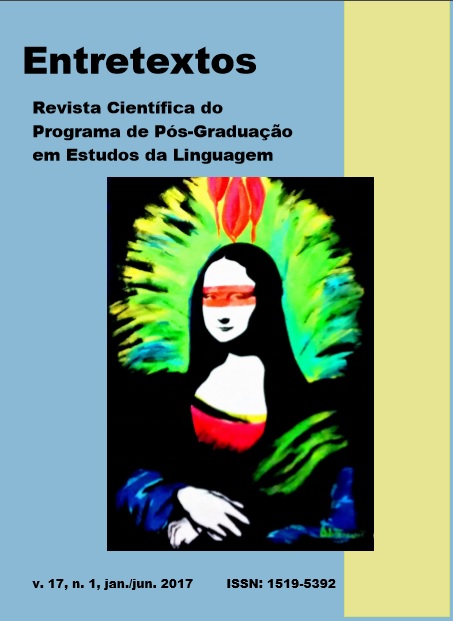"To have or not to have? that is the question!" executive secretarial students' beliefs about the English native speaker accent
DOI:
https://doi.org/10.5433/1519-5392.2017v17n1p95Keywords:
Beliefs, Accents, English Native Speaker, Foreign Speaker, UndergraduatesAbstract
This paper discusses the beliefs of twenty-one executive secretarial undergraduates about the native speaker accent in an English course at a federal university located in Minas Gerais, Brazil. The beliefs were mapped out through questionnaires and were portrayed through content analysis. The beliefs were thematically categorized, revealing important traits of how the undergraduates perceive the role of pronunciation and the native speaker accent while learning a new language. The results show that pronunciation is perceived as a very important issue for them, however, when compared to other types of classroom activities it ranks in a different position, with a clear preference towards conversation and listening as skills they can develop in the course. The native speaker accent is considered the parameter for sounding correctly, explaining why most of the group idealizes it as purpose. The students explain their beliefs by saying that sounding like a native will be useful to get better jobs and achieve professional success. The study points out that students and teachers need to think about the consequences of their beliefs and that the English language course can be the space for such discussions.Downloads
References
BARCELOS, A.M.F. What is wrong with a Brazilian accent? Horizontes de Linguística Aplicada, Brasília, v. 2, n.1, p. 7-21, 2003.
BARCELOS, A.M.F. Crenças sobre ensino e aprendizagem de línguas: reflexões de uma década de pesquisa no Brasil. In: ALVAREZ, M. L. O.; SILVA, K. A. (Org.). Linguistica Aplicada: Múltiplos Olhares. Campinas: Pontes, 2007. p. 27-69.
CANAGARAJAH, A.S.; WURR, A.J. Multilingual Communication and Language Acquisition: New Research Directions. The Reading Matrix, v.11, n.1, p.1-15, 2011.
CRUZ, N. C. Crenças de graduandos de Inglês Língua Estrangeira sobre a própria pronúncia. In: CONGRESSO LATINO-AMERICANO SOBRE FORMAÇÃO DE PROFESSORES DE LÍNGUAS, 2., 2007, Florianópolis. p. 360-373.
DÖRNYEI, Z. Research Methods in Applied Linguistics: quantitative, qualitative and mixed methodologies. Oxford: Oxford University Press, 2007. 336p.
GRADDOL, D.The Future of English? A Guide to forecast the popularity of the English Language in the 21st century. London: British Council, 1997. 65p.
GRADDOL, D. English Next. London: British Council, 2006. 128p. HALL, G. Exploring English Language Teaching: Language in Action. New York: Routledge, 2011. 282p.
HARMER, J. The practice of English Language Teaching. 3 rd . ed. Harlow: Pearson Education, 2001.
JENKINS, J. The Phonology of English as an International Language. Oxford: Oxford University Press, 2000.
JENKINS, J. English as a Lingua Franca. Oxford: Oxford University Press, 2007.
KUMARAVADIVELU, B. Language Teacher Education for a Global Society: a modular model for knowing, analyzing, recognizing, doing and seeing. New York: Routledge, 2012. 132p.
LEV-ARI, S.; KEYSAR, B. Why don't we believe non-native speakers? The influence of accent on credibility. Journal of Experimental Social Psychology, New York, v.46, n.6, p.1093-1096, 2010.
PATTON, M.Q. Qualitative evaluation and research methods. 2 nd ed. Newbury Park, CA: SAGE, 1990. 598p.
PENNYCOOK, A. The Cultural Politics of English as an International Language. London: Longman, 1994.
RICHARDS, J.C.; SCHMIDT, R. Longman Dictionary of Language Teaching and Applied Linguistics. 3 rd . ed. London: Pearson Education, 2002. 595p.
SALDAÑA, J. The coding manual for qualitative researchers. London: SAGE, 2009. 223p.
SANTOS, T. J. P. Crenças sobre pronúncia na formação de professores de lingual inglesa. Fronteira digital, v.2, n.2, p. 8-15, 2010.
SCHMITZ, J.R. "To ELF or not to ELF?" (English as a Lingua Franca): That's the question for Applied Linguistics in a globalized world. Revista Brasileira de Linguística Aplicada, Belo Horizonte, v.12, n.2, p.249-284, 2012.
SCHMITZ, J. R. Um mundo globalizado, híbrido, pós-colonizado e pósmoderno:Reflexões sobre o inglês na atualidade. Folio (Online): Revista de Letras, v. 8, p. 333-365, 2016.
VYGOTSKY, L.S. Mind in Society. Cambridge: Harvard University Press, 1978. 158p.
VYGOTSKY, L.S. Thought and Language. Expanded and revised. Cambridge, MA: MIT Press, 2012. 307p.
VYGOTSKY, L.S.; LURIA, A. Ape, Primitive Man, and Child: Essays in the History of Behaviour. New Jersey: Lawrence Erlbaum Associates, 1993.
Downloads
Published
How to Cite
Issue
Section
License
Copyright (c) 2017 Entretextos

This work is licensed under a Creative Commons Attribution 4.0 International License.
Entretextos adota a Licença Creative Commons Attribution 4.0 International, portanto, os direitos autorais relativos aos artigos publicados são do/s autor/es.
Sob essa licença é possível: Compartilhar - copiar e redistribuir o material em qualquer suporte ou formato. Adaptar - remixar, transformar, e criar a partir do material, atribuindo o devido crédito e prover um link para a licença e indicar se mudanças foram feitas.























